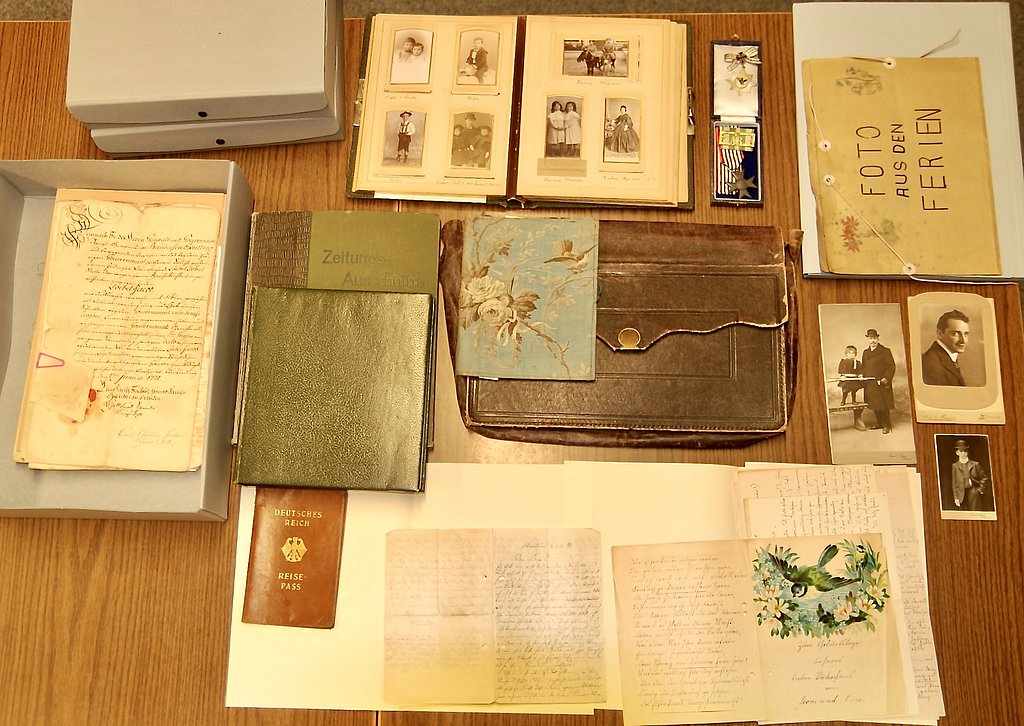When the descendants of Alice Salomon donated large parts of the family estate to the Alice Salomon Archive (ASA) in 2021/22, the joy was great. Since no estate of Alice Salomon herself has survived and the history of her family has hardly been researched, the Salomons' family estate promises new insights. The focus of this collection - in addition to Alice Salomon herself - is on her nieces: Maria Hepner (1896-1992) and Leonie Cahn (née Hepner, 1896-1994). The two women were also the ones who preserved the family estate, carried it with them for many years, and thus made it possible for their children's children to ultimately present it to the ASA. The twins Maria and Leonie spent parts of their youth on the family estate in Kopanin, in Berlin and at the family-owned castle Heidewilxen in Silesia. As young women, they were drawn back to the big city of Berlin, where they enjoyed the cultural life and worked for a time at the Social Women's School in Berlin-Schöneberg.
Extensive correspondence, diaries, and manuscripts trace the families' lives over the years. In the 1920s, Leonie and her husband Fritz Cahn moved to Switzerland, where Maria followed them in 1933 because she had to flee after a Nazi house search. In 1974, the two women emigrated to Great Britain, where they lived together until the end of their lives. The National Socialists forced not only Alice Salomon into exile in 1937. Her family, which had been at home in Germany, had to flee all over the world: Salomon's niece Charlotte Löwenstein (née Hepner, 1893-1951) emigrated to Palestine as early as 1924, her nephew Fritz Hepner fled to Uruguay in 1939 after being released from a concentration camp, and other family members emigrated to Great Britain, Argentina, and the United States. Alice Salomon's sister Olga Reisner (1876-194?), as well as her nephew Richard Salomon (1894-1942/3), however, were deported to extermination camps. Richard was murdered in Auschwitz.
In the many letters that the families wrote to each other, we can read about the adversities they had to face, but also about the numerous visits between the family members. Fortunately, thanks to the extensive collection of photographs, we also have faces to go with these letters, diaries and travel books, birth, marriage and death certificates.
The documents tell countless small and large stories, as they are part of the everyday life of many families. But the fact that many family members were forced to leave their homes, while others fell victim to Nazi terror, sets this family history apart from others. We gain insight here not only into the family that produced Alice Salomon, but also into Jewish bourgeois life in the late 19th to mid-20th centuries, the experience of flight, expulsion, murder, and life in the Jewish Diaspora.
In July 2022, the project „The Twins and Aunt Ly: A Digitization Project on Alice Salomon's Family History“ started, funded by the Research and Competence Center Digitization Berlin (digiS). Within 1.5 years, the ASA team will digitize a large part of the valuable family estate, process it scientifically, and make it accessible to the interested public.[1]
In addition, the project includes three mediation modules. In a virtual exhibition in the DDBstudio (Deutsche Digitale Bibliothek), via the website Jewish Places (Stiftung Jüdisches Museum Berlin) and via the berlinHistory app, the family history, but also the history of social work, can be experienced. On interactive maps, digital copies of texts and images, audio interviews and points of interest are located and contextualized with explanatory texts. In this way, for example, the past times of Salomon and her family in Berlin can be brought into the present in the form of city walks.
Project name: The Twins and Aunt Ly A digitization project on Alice Salomon's family history (2022)
Project duration: 08/15/2022 to 12/31/2023
Project management: Prof. Dr. Sabine Toppe
Project team members: Filiz Gisa Çakır (project manager), Friederike Mehl, Pascal Paterna
Cooperation partners: berlinHistory e. V., Stiftung Jüdisches Museum Berlin
Funding: Forschungs- und Kompetenzzentrum Digitalisierung Berlin (digiS)
Contact:
[1] This collection is supplemented by the estate of Joachim Wieler, whose research on Salomon's life in exile in New York made possible the publication of Salomon's autobiography „Character is Destiny“ in Germany for the first time in 1983. These archival materials document the rediscovery of Salomon's importance for social work, the international women's movement, and the city of Berlin.



